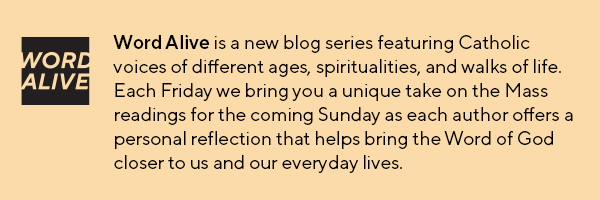



The reason for our hope | Word Alive
Brett Salkeld
Friday, May 15, 2020

Photo by Greg Rosenke on Unsplash
The reason for our hope
A reflection for the Sixth Sunday of Easter, Year A
by Brett Salkeld
At a time when many Christians feel under attack from the surrounding culture, it can be easy for us to justify using the tools of the enemy. Anyone, surely, would grow impatient at such mistreatment, falsehood, deception, calumny! We may be tempted to justify ourselves and claim that our anger is righteous anger. But righteous anger does not simply mean anger at injustice (though it does mean that) but anger properly directed. We must be angry not merely for the right reasons but in the right way. Jesus tells his disciples, “If you love me you will keep my commandments.” And what are his commandments? The Sermon on the Mount is probably the best summary we have of them. And what Peter teaches in today’s second reading is in the spirit of the Teacher who gave that revolutionary sermon. When “giving reason for your hope,” that is, when preaching the Gospel, “do it with gentleness and reverence, keeping your conscience clear, so that, when you are maligned, those who defame your good conduct in Christ may themselves be put to shame.” This is so hard! Many of us can imagine situations in which Peter, as an early evangelist, might have found himself that led him to this wisdom. We have been in such situations ourselves. Have we learned what Peter learned? Peter was a little hot-tempered. It was he who had drawn the sword in the garden and cut off a man’s ear. An ear is not far from a jugular. It is not impossible that Peter had intended a death stroke. Yet, after years in the mission field, he learned that gentleness and reverence were more effective weapons. But they are weapons that require trust. It is much easier to want to take things into our own hands. To make sure our point is heard. To make sure our opponent is refuted. Peter probably learned the hard way (the Gospels are pretty clear that he was not a quick study!) that this manner of engaging is not effective. It is easy to justify our bad behaviour because we don’t want to suffer. And Peter had learned that he suffered whether he did good or ill. For someone who did not know Christ, that might have been a hopeless situation. And some people might well abandon hope and say, “If I’m going to suffer either way, I’ll just do evil. If there is no reward for good, why bother?” Peter, on the other hand, had seen the wisdom of the Sermon on the Mount play out in the death and resurrection of Christ – and, we can imagine, over and over in his own life of discipleship and evangelization. He learned that “it is better to suffer for doing good, if that be the will of God, than for doing evil.” Why? Because Christ suffered the worst consequences – an unjust execution of an innocent man – for doing good, and God the Father honoured that suffering by raising him from the dead and putting his enemies to shame. That same dynamic is at play when we put away our swords, when we refuse to fight our battles with the devil’s weapons. It looks, for a time, like death and loss. It can feel like we are giving up. Giving up on truth. Giving up on justice. But we know in faith, and can learn from experience, as Peter must have, that we can’t beat the devil with his own weapons. When, instead, we use the weapons Christ gives us – weapons that don’t even seem like real weapons – we find God giving us the victory. It is often easier to see this when it happens to others. It is much easier to counsel a friend not to engage in unproductive fights than to avoid such fights ourselves. It is easier to see, from the outside, how the one who lacks gentleness and reverence is probably the one losing the argument than it is when we are the target of the attack. Indeed, one of the effects of sin in our lives is our inability to see things in ourselves that we perceive easily in others. And overcoming this kind of spiritual blindness is the work of the Holy Spirit. Jesus knows we will be unable to keep his commandments by our own power. But he stuck with Peter, screw-up after screw-up. And, with the help of the Holy Spirit, Peter did learn . . . eventually. If this is a struggle for us, we are in good company. But we have not been left orphans. We are adopted daughters and sons of God who have received the gifts of the Spirit. As we practice gentleness and reverence, we will find a strength supporting us that is not our own.The readings for the Sixth Sunday of Easter, Year A, are Acts 8:5-8, 14-17 1 Peter 3:15-18 John 14:15-21
 Brett Salkeld is Archdiocesan Theologian for the Roman Catholic Archdiocese of Regina. He is the author of several books, including, most recently, Transubstantiation: Theology, History, and Christian Unity. He lives in Regina with his wife, Flannery, and their seven children.
Brett Salkeld is Archdiocesan Theologian for the Roman Catholic Archdiocese of Regina. He is the author of several books, including, most recently, Transubstantiation: Theology, History, and Christian Unity. He lives in Regina with his wife, Flannery, and their seven children.

Click here for all articles in the Word Alive series
Related Articles:
<<
SUPPORT LABEL
$50
$100
$150
$250
OTHER AMOUNT
DONATE
Receive our newsletters
Stay Connected
Receive our newsletters

Stay Connected







